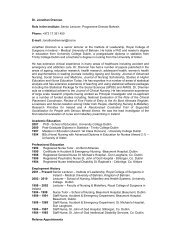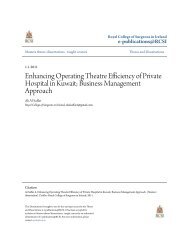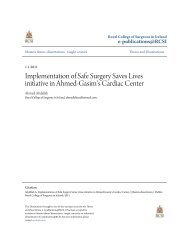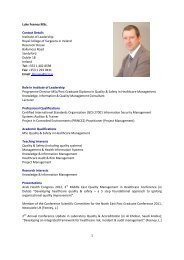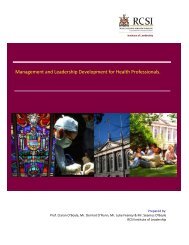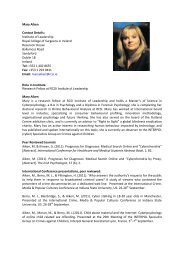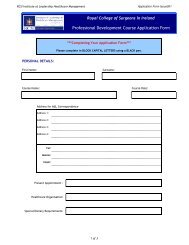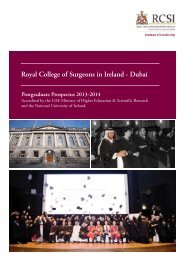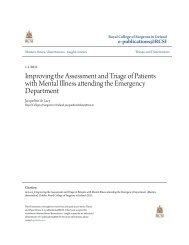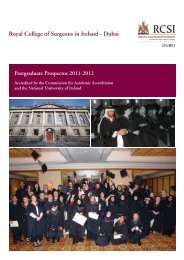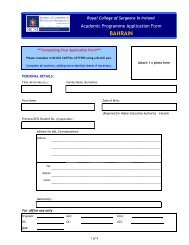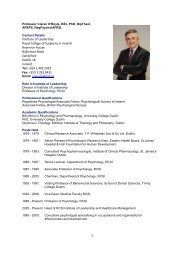Evaluation of MSc programmes: MSc in Healthcare Management ...
Evaluation of MSc programmes: MSc in Healthcare Management ...
Evaluation of MSc programmes: MSc in Healthcare Management ...
You also want an ePaper? Increase the reach of your titles
YUMPU automatically turns print PDFs into web optimized ePapers that Google loves.
Students were asked to rate their level <strong>of</strong> agreement or disagreement on a fivepo<strong>in</strong>t<br />
scale on 39-items that comprised eight scales <strong>of</strong> the CEQ and the ECEQ. The<br />
eight scales used <strong>in</strong> this study <strong>in</strong>cluded: the Good Teach<strong>in</strong>g Scale, Clear Goals and<br />
Standards Scale, Appropriate Workload Scale, Generic Skills Scale, Learn<strong>in</strong>g<br />
Community Scale, Intellectual Motivation Scale and the Graduate Quality Scale.<br />
1.2.3.2 Master’s Outcomes <strong>Evaluation</strong> Questionnaire<br />
Outcomes related to leadership and management were measured us<strong>in</strong>g an<br />
<strong>in</strong>strument developed specifically for this evaluation: the Masters Outcomes<br />
<strong>Evaluation</strong> Questionnaire (MOEQ). The items on the subscale were identified and<br />
developed from an extensive review <strong>of</strong> the literature and course documentation<br />
perta<strong>in</strong><strong>in</strong>g to leadership outcomes <strong>in</strong> healthcare management. The questionnaire<br />
consisted <strong>of</strong> 31-items measur<strong>in</strong>g four doma<strong>in</strong>s seen as relevant to leadership and<br />
management practice: 1) ability to change pr<strong>of</strong>essional practice (9 items); 2)<br />
leadership capabilities (6 items); 3) communication and teamwork (6 items) and;<br />
3) problem solv<strong>in</strong>g (10 items).<br />
The MOEQ was designed to <strong>in</strong>corporate a retrospective pre-test design. Students<br />
were asked firstly to rate their ability follow<strong>in</strong>g their master’s programme (posttest)<br />
and then to th<strong>in</strong>k back and rate their ability before the commencement <strong>of</strong><br />
their master’s programme (retrospective pre-test/then-test) on a seven-po<strong>in</strong>t<br />
scale that was anchored by 1 = low understand<strong>in</strong>g/ability to 7 = high<br />
understand<strong>in</strong>g/ability. The rationale for us<strong>in</strong>g this approach was to account for<br />
the confound<strong>in</strong>g factor <strong>of</strong> response-shift bias and to identify whether the<br />
outcomes were be<strong>in</strong>g achieved as a consequence <strong>of</strong> the programme or were due<br />
to other <strong>in</strong>fluence such as <strong>in</strong>-service education, further education, maturation or<br />
employment (Drennan & Hyde 2008).<br />
Table 2 Def<strong>in</strong><strong>in</strong>g Items <strong>of</strong> the Masters <strong>in</strong> Nurs<strong>in</strong>g Outcomes <strong>Evaluation</strong> Questionnaire Scales<br />
Scale<br />
Def<strong>in</strong><strong>in</strong>g Items<br />
Change Pr<strong>of</strong>essional<br />
Ability to change and <strong>in</strong>fluence practice<br />
Practice<br />
Leadership<br />
Communication and<br />
Teamwork<br />
Ability to use leadership theories to <strong>in</strong>form pr<strong>of</strong>essional practice<br />
Ability to communicate and work as a member <strong>of</strong> a team<br />
7



